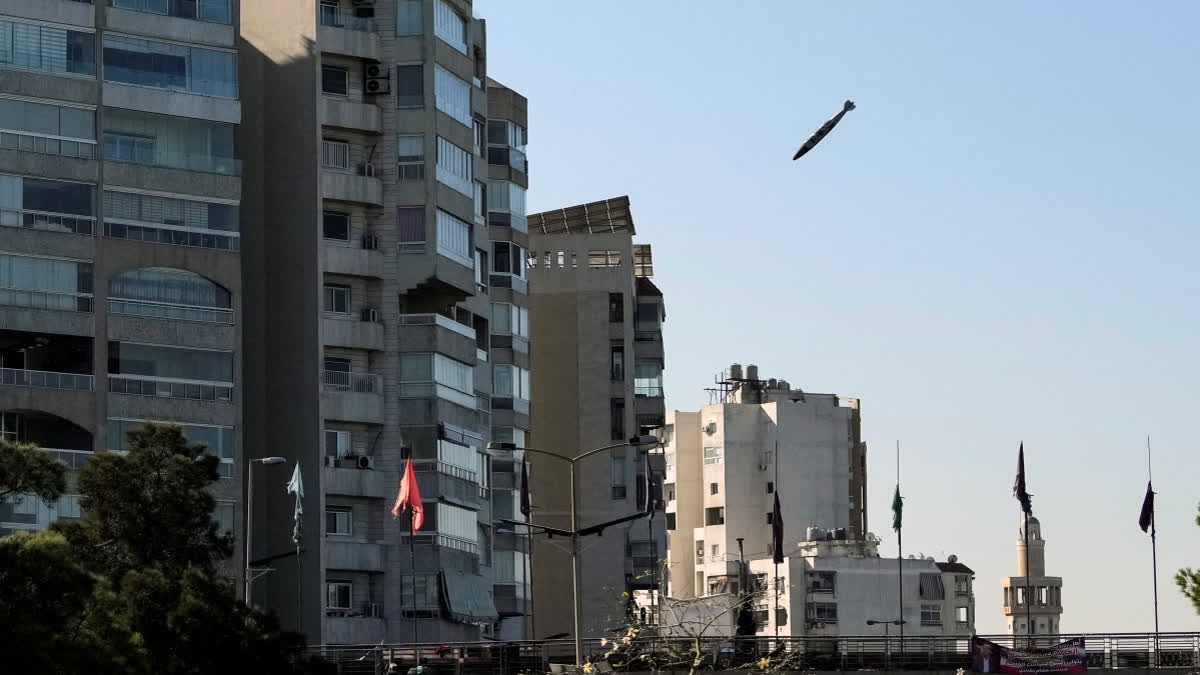Beirut: Lebanon’s caretaker prime minister on Friday asked Iran to help secure a cease-fire in the war between Israel and Hezbollah and appeared to urge it to convince the militant group to agree to a deal that could require it to pull back from the Israel-Lebanon border.
The prime minister made the comments in talks with Ali Larijani, a top adviser to Iran’s supreme leader, Ali Khamenei. Larijani’s visit to Lebanon comes as the United States continued pushing both sides to agree to a deal to end 13 months of exchanges of fire between Israel and Hezbollah.
Iran is a main backer of Hezbollah and for decades has been funding and arming the Lebanese militant group. Hezbollah began firing rockets into northern Israel the day after Hamas’ surprise attack into Israel on Oct. 7, 2023 ignited the war in Gaza – prompting exchanges between the two sides ever since.
Since late September, Israel dramatically escalated its bombardment of Lebanon, vowing to cripple Hezbollah and end its barrages in Israel. More than 3,300 people have been killed in Lebanon by Israeli fire – 80% of them in the past month -- Lebanon’s Health Ministry says. According to Lebanese media, U.S. Ambassador Lisa Johnson handed over a draft of a proposed cease-fire deal to Lebanese Parliament Speaker Nabih Berri, who has been leading the talks representing Hezbollah.
A Lebanese official confirmed that Beirut has received a copy of a draft proposal based on U.N. Security Council resolution 1701, which ended the last Israel-Hezbollah war, in the summer of 2006.
That resolution, among other things, said that only the Lebanese army and U.N. peacekeepers should operate in southern Lebanon, meaning Hezbollah would have to end its presence there. That provision was never implemented. Lebanon accuses Israel of also violating the resolution by maintaining hold of a small, disputed border area and conducting frequent military overflights over Lebanon.
The Lebanese official did not give details other than to say Israel was insisting that some guarantees be included. The official spoke on condition of anonymity, because they weren’t authorized to speak to the media about the ongoing talks.
The U.S. Embassy refused to either confirm or deny the reports.
In talks with Larijani, caretaker Lebanese Prime Minister Najib Mikati urged Iran to help implement resolution 1701. He said the Lebanese government wants the war to end and the resolution to be implemented “in all its details,” according to a statement on the talks issued by his office.
Mikati, who in recent weeks has become more critical of Iran’s role in Lebanon, also said the government wants Iran to help Lebanon’s national unity and not take any stance backing one party against another. Iran’s backing for Hezbollah has helped the group, which is the most powerful faction among Lebanon’s Shiite Muslims, dominate the country’s politics the last decade.
After meeting Mikati and Berri, Larijani said his visit’s main aim was “to loudly say that we will stand by Lebanon’s government and people.” Asked if he was trying to thwart U.S. cease-fire mediation, Larijani said, “We are not trying to blow up any effort, but we want to solve the problem and we will stand by Lebanon, whatever the circumstances.”
Larijani held similar talks a day earlier in Syria with President Bashar Assad. Syria’s state news agency said that Assad and Larijani discussed the “ongoing aggression on Palestine and Lebanon and the necessity of stopping it.” While Larijani was in Beirut, Israeli forces carried out a new strike on the southeastern edge of the city.
Images taken by an Associated Press photographer showed a rocket about to strike an 11-story residential building in Beirut’s Tayouneh neighborhood – then a blast of flame erupts from the side of the building. Much of a lower level of the building was smashed to rubble. There were no immediate reports of casualties. The Israeli military had issued a warning before the attack, saying it was a facility that belonged to Hezbollah.
Near the eastern Lebanese city of Baalbek, rescue teams continued searching through the rubble Friday at the site of an Israeli strike the night before that hit a civil defense center in the town of Douris. So far, the bodies of 13 employees and volunteers with the Lebanese Civil Defense had a been recovered, the agency said, as well as some other remains that will require DNA testing.
Israel expanded its operations in Lebanon even as it continues its campaign in the Gaza Strip, vowing to destroy Hamas, which is also backed by Iran. Funerals were held Friday for 11 Palestinians killed Thursday in a series of Israeli airstrikes in and around the central Gaza Strip city of Deir al-Balah. Two children were among the dead, seen with the other dead by an AP reporter.
On Thursday, the U.N. Security Council’s 10 elected members circulated a draft resolution demanding “an immediate, unconditional and permanent cease-fire” in Gaza. The U.S., Israel’s closest ally, holds the key to whether the U.N. Security Council adopts the resolution. The four other permanent members — Russia, China, Britain and France — are expected to support it or abstain.
The Israel-Hamas war began after Palestinian militants stormed into Israel on Oct. 7, 2023, killing about 1,200 people — mostly civilians — and abducting 250 others.
Israel’s bombardment and ground offensives since then have killed more than 43,000 people in Gaza, Palestinian health officials say. The officials don’t distinguish between civilians and combatants but say more than half of those killed have been women and children.



